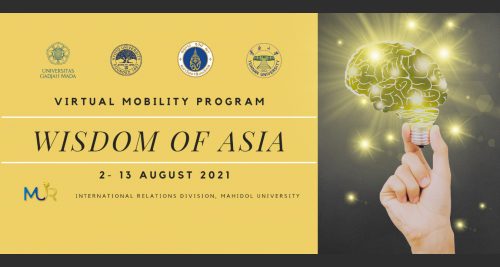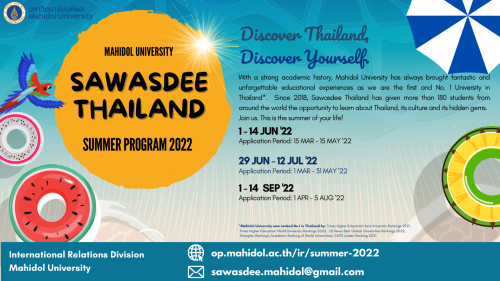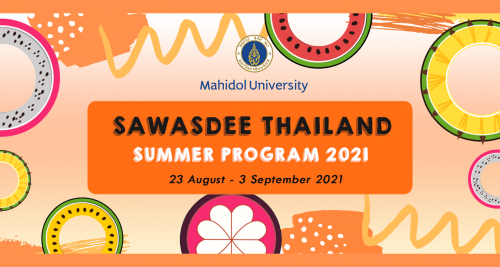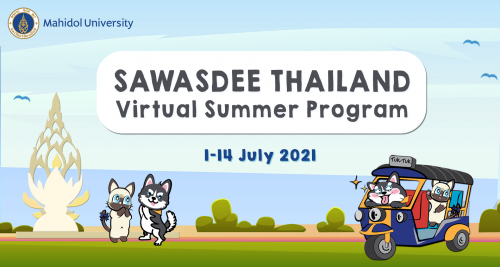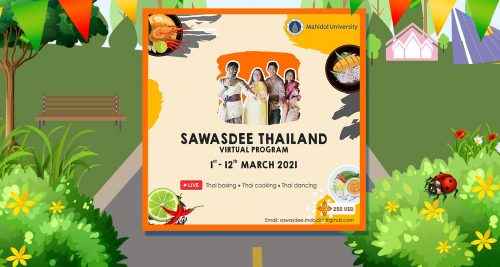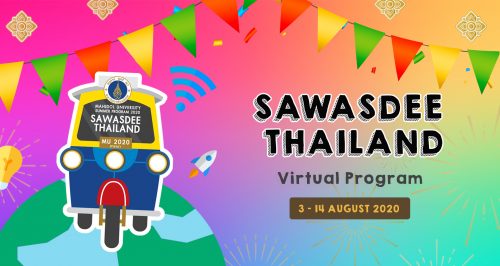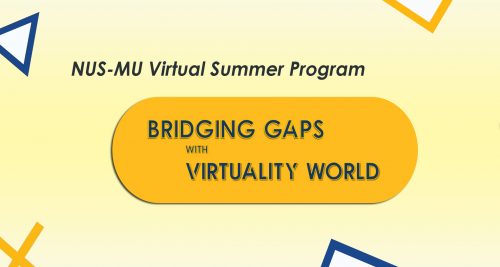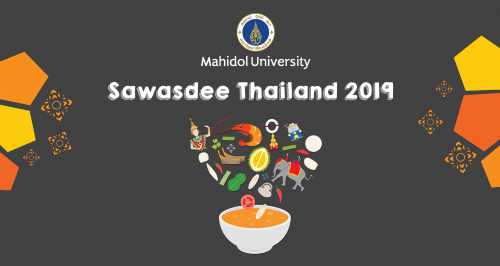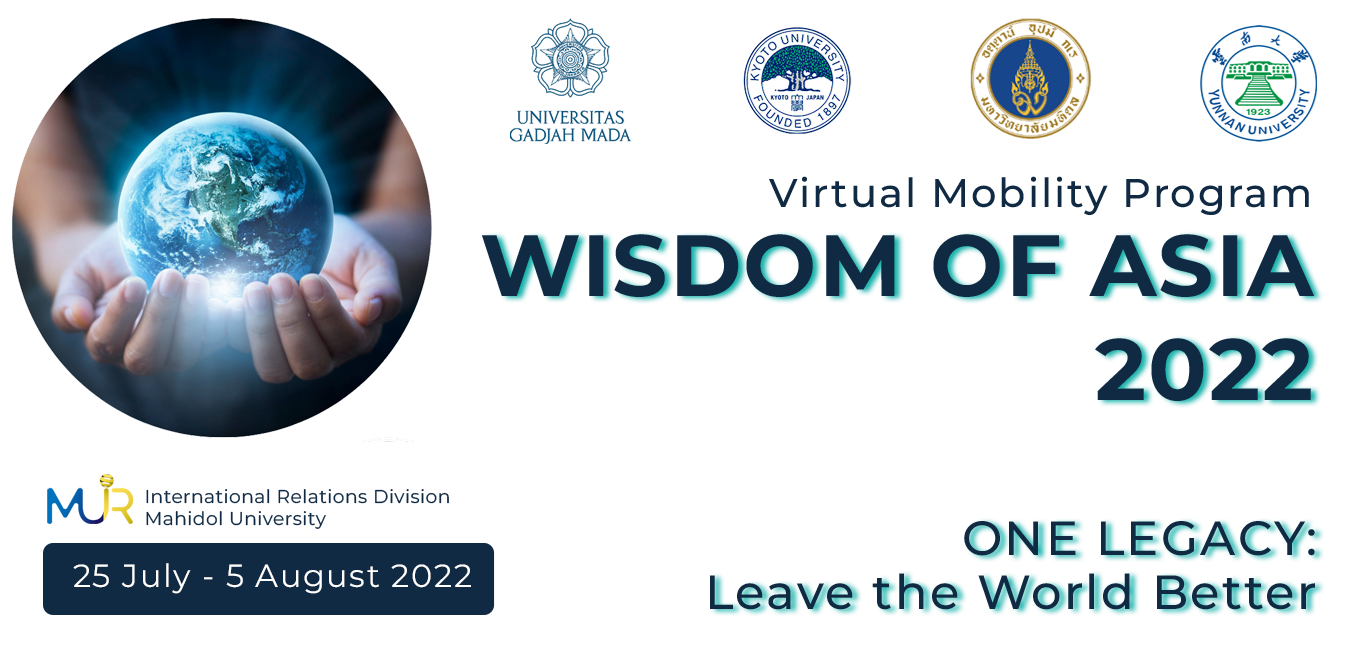

Wisdom of Asia is a virtual mobility program organized by the International Relations Division, Mahidol University, and developed from the ASEAN+3 Mobility Program in which Mahidol University cooperates with several universities in ASEAN and ASEAN+3 countries. The program allows Mahidol University students to travel to other ASEAN countries to learn more about the host nation’s history, culture, and language for a 2 – 4-week period during the summer break (June – August) each year, and earn two elective credits for the “Comparative Cultures” elective course.
Due to the global COVID-19 pandemic, all physical mobility activities have been halted. We wanted to present an alternative program that would allow our students to interact with students from other countries, so we re-designed the ASEAN+3 Mobility Program as a virtual learning program called “Wisdom of Asia.”
Through the Program, participants from co-host universities will learn, share their experiences, and work together via online platforms for two weeks with guidance from faculty advisors. At the end of the program, participants will demonstrate their knowledge and skills by creating and sharing a group presentation. With international exchange as a significant aspect of the structure of this virtual mobility program, we hope to provide all participants with new experiences and perspectives by understanding and learning from one another.
This year marks the second year that we will run this program online, with three leading universities from China, Indonesia and Japan serving as co-hosts, ensuring that all participants gain diverse and useful experience and skills.

Through the Wisdom of Asia virtual mobility program with this year’s theme “ONE Legacy: Leave the World Better”, participants will be able to gain a deeper understanding of key topics through pre-recorded lectures conducted by professional instructors, and they will have the opportunity to express their opinions and share their experiences during the live classes. Following these classes, participants will be divided into groups composed of students from each university, allowing students of various nationalities to interact. Participants in these groups will research on their chosen topics and collaborate on the final group report using various digital platforms. Each group will also be given time to discuss the progress of their final group report and presentation with their assigned advisor.
At the end of the program, each group of participants is expected to present their project, to the program advisor, commentators and other participants, which they have been working on for the previous two weeks. The purpose of this presentation is to provide a forum for participants to share their perspectives and the conclusions they have reached as a result of their own discussions. During the program, participants will also have a chance to learn and understand other participants’ cultures through a range of cultural activities.

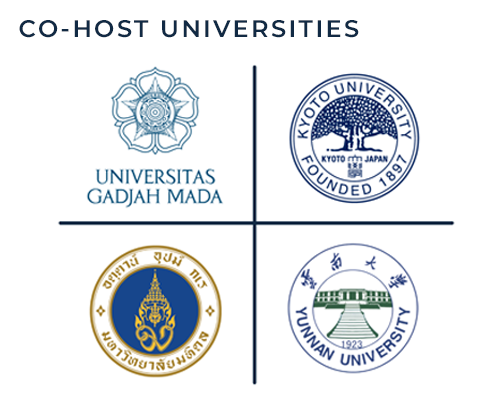
Four co-host universities from ASEAN and ASEAN+3 countries will collaborate on this program. There will be a total of 40 student participants, 10 students from each co-host university, as well as four advisors, one from each co-host university. The program will consist of lectures, cultural activities and group studies, all of which will be delivered through any suitable online platforms. The instructors from the four co-hosts universities will take turns leading lectures and conducting activities on relevant topics organized around five essences, as follows:


1) Connecting Borders through the Virtual World
An introduction to each co-host university’s country and campus may help facilitate participants in recognizing and understanding Thailand, China, Indonesia and Japan, as well as their respective identities. This essence will encourage the participants to be more empathetic and open-minded towards cultural differences, as well as different ways of life and philosophies.
2) 17 Sustainable Development Goals: Goals to Reality (Connecting Classrooms and Communities for Global Awareness)
The essence will guide participants through a practical understanding of the “United Nations Sustainable Development Goals: 17 Goals to Transform Our World” by learning from national policies or case studies from ASEAN+3 countries. Finally, they will be able to reflect on global or national issues through the eyes of their generation and begin to develop the idea, possibilities or methodology to better respond to the world’s challenges or issues today.
Related subjects / keywords: Sustainable Development / Sustainable management / Global Issue
3) Design Thinking: A View through the Lens from now to the Future
Design thinking is a methodology for creative problem-solving. It is all about understanding challenges and solving problems by using this human-centered design. This module will guide the participants on how to build capabilities and mindsets for making anything possible based on facts and the end user’s perspective. Starting from understanding the roots of problems to the world’s challenges or issues, the participants will review and learn techniques to understand mankind’s motivations from the current situation and think forward deeply to create new ideas or innovations for the future by planning to conduct effective mock-up design research, and finally, making a plan to iterate their ideas forward. Design thinking is an adaptable technique for overcoming challenges in daily life as well as their professions in the future.
Case study Example: <https://www.forbes.com/sites/cartier/2022/03/03/9-women-whose-impact-businesses-are-changing-lives/?sh=3f49607d4e3c>
Related subjects / keywords: Design Thinking / Innovation / Innovative Thinking / Problem Solving
4) Legacy: “2040: What kind of world will your generations inherit?”
We’ve seen rapid changes in these past few years. COVID-19 has altered the entire world and the way people live their lives, and this adaptation is now the new normal for years to come. What about in 18 years when 2040 reaches us? The essence will shape these responses by wrapping contents and re-building the awareness, leading to an idea that may become their generation’s legacy.
The essence will help the participants forecast the future and inspire them to make a better change using these following questions:
What is going to be your generation’s values?
What are going to be the most wanted core skills for work and career?
What kind of world will your generations inherit?
Finally, it aims to help the participants to plan and get prepared for the forthcoming future when their generation drives the future
5. Cultural Workshop
This essence will allow participants to understand the cultural aspects of each country. Participants can gain a deeper understanding of themselves and others, learn to appreciate other cultures and ideas, and become more open to compromise by immersing themselves in another culture.

Lectures (Recorded / Live) | 34 hours (32 required + 2 elective) | - A live teaching class in which participants can interact with the instructor (lecture and discussion). - A pre-recorded class in which participants can study at their own pace. |
Cultural activities | 4 hours | A live workshop in which participants from different countries will learn and share their identities and cultural aspects of their country. |
Group studies | - | Participants work on their final report (in groups of four), based on their chosen topic and research, using online platforms. |
Group project discussion with advisor | 30 minutes for each group after a week of working | Participants will consult and report the progress of their final project with their advisor through an online platform. |
Final report and presentation | A report and a 15 minute-presentation per group (Oral presentation: 7-10 minutes and Q&A: 5-8 minutes) | - Report - Presentation: Oral presentation of the group report and Q&A session from advisors/ commentators/other participants |

PERIOD | ACTIVITIES | REMARKS |
June 2022 | Call for applications | Contact your affiliate university for application |
11 July 2022 | Announcement on selected participants | 40 participants in total, 10 students from each co-host university |
25 July – 15 August 2022 | The official program | Consult and report the progress with their advisors at end of first week |
15 August 2022 | Final group presentation | Commented, questioned and evaluated by the advisor and commentators |

Participant Recruitment
- Participants should have a good grasp of English which allows them to work together in international groups and engage in academic discussions.
- Participants should have good skills with many kinds of online platform in order to participate in all activities, work on their project and communicate with their group and advisor.
- Participants should come from a mix of different disciplines within the university.
- Should there be an overwhelming response from a university’s students, each university is free to organize selection interviews as they deem fit.

Program Costs
- Online program costs will be borne by each co-host university, meaning that each university will be responsible for all costs, including teaching allowance, cultural activities, production and management, for both live sessions and recorded sessions.
- Student participants will bear the cost of their registration fee for the related course (if this program is credit-bearing at the participant’s home university). For example, for Mahidol University students, they have to register for the elective course SHHU116: Comparative Cultures in Semester 1.

Participants
-
- Each university will nominate 10 of its own undergraduate students to take part in this program. Students nominated must be able to attend the program from beginning to end.
- 40 participants will be divided into 10 groups of 4 students, mixing from 4 co-host universities by the organizing team.
-

Credits
- After completing the program, participants may or may not receive credits according to the regulations of their home university. For example, Mahidol University students will earn 2 elective credits for the course SHHU116 Comparative Cultures.

Submission of Materials
- List of 10 participants from each co-host university (in the given Excel file).
- Individual photo (good quality) of each participant.
- Certificate of University Enrollment (or Certificate of Degree) or any documents to prove/confirm that the participant is currently studying at one of the co-host universities.

Benefits
- A Certificate of Participation
- A set of gifts
- Credits (depending on the participant’s affiliate university)
* The above benefits will be granted to the participants with full attendance.

International Relations Division, Mahidol University | Tel: 66 (0) 2849-6235 | Fax: 66 (0) 2849-6237 | Contact us: opinter@mahidol.ac.th
